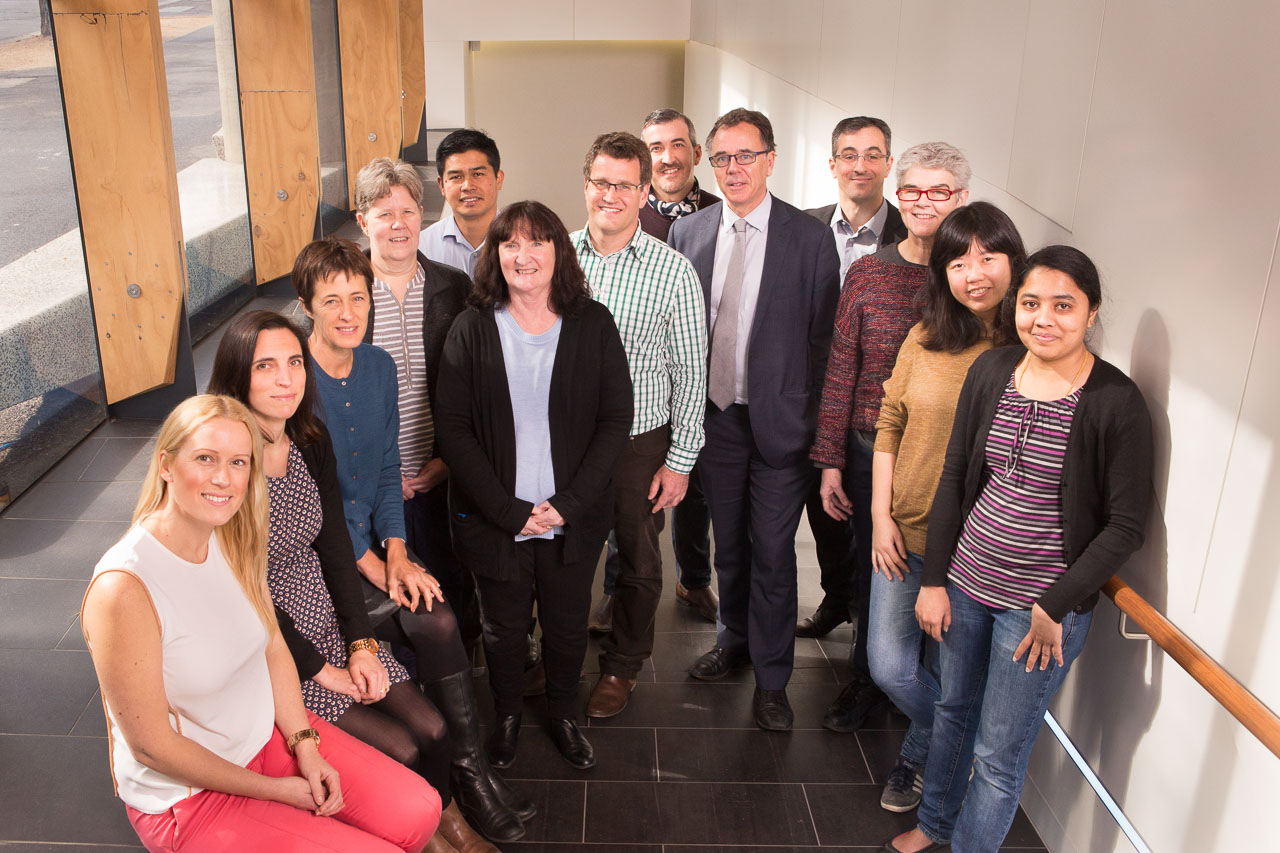-
Research Groups
-
VICNISS
The VICNISS Coordinating Centre provides a state-wide, standardised surveillance service for healthcare associated infections (HAIs) and related events. The goal of VICNISS is to monitor and reduce the incidence of HAIs, providing support for health services in Victoria. VICNISS aims to support Victorian health services to carry out international best practice surveillance and analysis, and to lead interventions for quality improvement to improve the health of all Victorians.
VICNISS provides a source of high quality data for regular performance monitoring, and for a valuable resource for the research community. Over the time of VICNISS surveillance, infection rates in key areas of focus have fallen markedly, reducing the significant financial and personal cost of these infections on both individual patients and the health system.
VICNISS collaborates with the National Centre for Antimicrobial Stewardship (NCAS), with a major involvement in aged care NAPS (ac-NAPS). VICNISS is also engaged by DHHS Residential Aged Care Services to carry out monitoring of infection control indicators in Victoria’s public residential aged care services, including participation in ac-NAPS.
Current Projects
-
Infections and events monitored by the coordinating centre include:
- Line-associated bloodstream infections in intensive care units (adult, paediatric and neonatal)
- Line associated bloodstream infections outside of intensive care units
- Ventilator-associated events in intensive care units
- Surgical site infections
- Staphylococcus aureus bloodstream infections in patients admitted to hospital
- Clostridium difficile infections
- Haemodialysis related infectious events
- Methicillin-resistant S.aureus infections and vancomycin-resistant enterococcal infections
- Carbapenamase-resistant enterobacteriaceae (in collaboration with DHHS)
- Occupational exposures of healthcare workers to blood and body fluids
- Healthcare worker seasonal influenza vaccination
- Surgical antibiotic prophylaxis compliance
- Peripheral venous catheter use
-
Community Staphylococcus aureus infections
Hospitals in Victoria submit data on all hospitalised S.aureus bloodstream infections, including those considered to be “community acquired”. Rates of infection have undergone a considerable increase in recent years, and VICNISS is currently investigating in conjunction with colleagues in Western Australia observing a similar increase. We are also consulting with MDU on this project, and may undertake collaborative work to investigate possible causes of this increase.
-
Surgical antibiotic prophylaxis
Having access to a very large database of compliance and outcome data allows us to investigate many aspects of surgical prophylaxis. We are comparing the effectiveness of different antibiotic regimens for various surgical procedures.
VICNISS is investigating the differences in infection outcome when intra-operative re-dosing was and was not recorded as being performed for lengthy surgical procedures.
-
Infections and antimicrobial use in residential aged care
Using data collated in pilot programs in Victoria preceding ac-NAPS, and data from the ac-NAPS surveys, VICNISS and NCAS have published a series of articles focussing on the prevalence of infections and antimicrobial usage in residential aged care homes.
-
Trends in infection rates in Victoria
The VICNISS team regularly publish analyses of infection rates, pathogens and related indicators in Victoria to examine trends.
Lab Team

-
Director VICNISS
-
Operations Director (VICNISS)
-
Consultant Infectious Diseases Physician
-
Infectious Disease Physician
-
Aged Care NAPS Project Officer | Senior Infection Control Consultant VICNISS
-
Mrs Kylie SnookSenior Infection Control Consultant
-
Ms Sam DicksonSenior Infection Control Consultant
-
Ms Khosi DubeSenior Infection Control Consultant
-
CNC Infection Control
-
Database Manager
-
Net SQL Programmer
-
Business Intelligence Reporting Developer
-
Mr Rashedul HasanDatabase Administrator/Developer
-
Mr Atal MalavdeNet SQL Programmer (NISPAC project)
-
Biostatistician
-
Dr Stephanie TanamasEpidemiologist
-
Ms Andrea BrebnerProject Officer/Office Manager
-
Centre for Antibiotic Allergy and Research
The Centre for Antibiotic Allergy and Research focuses on translational drug allergy diagnostics, health services interventions and antibiotic allergy clinical trials.
Other work areas include:Public Health
-
Howden Group
Research from Professor Ben Howden’s group uses genomics, molecular biology, epidemiology and clinical studies to address a broad range of issues related to invasive bacterial diseases in humans, especially those caused by staphylococci, enterococci and other antimicrobial-resistant species. Additionally, working closely with scientists in the MDU PHL, they investigate the epidemiology, evolution and spread of bacterial pathogens of public health significance such as Neisseria gonorrhoea, Listeria monocytogenes, Shigella and Salmonella spp., Legionella spp., and carbapenemase-producing gram-negative bacteria.

Professor Benjamin Howden
Director Of Microbiological Diagnostic Unit (MDU) Public Health Laboratory
-
Liaskos Group
The Liaskos group is primarily focused on understanding the cellular and molecular mechanisms of host-pathogen interactions, with particular focus on bacterial pathogens and bacterial membrane vesicles. We use a range of microbiology and immunology-based techniques to examine how bacterial pathogens that infect humans cause disease, and how the host detects and responds to these pathogens and their products.
Other work areas include:Immunology, Bacterial and Parasitic Infections
-
McVernon Group
Jodie McVernon’s group uses established and emerging biostatistical, epidemiologic and modelling methods to address infectious diseases questions of public health relevance. We bring a suite of collaborators from animal health and ecology to provide a ‘One Health’ perspective on emerging human pathogens.
Other work areas include:COVID-19, Viral Infectious Diseases, Public Health
-
National Centre for Antimicrobial Stewardship
The National Centre for Antimicrobial Stewardship (NCAS) is a health services research program that aims to improve the use of antimicrobials across animal and human health, to influence national policy, and to generate a research workforce across nurses, pharmacists, doctors and veterinarians. NCAS aims to lead and facilitate the embedding of antimicrobial stewardship (AMS) within clinical practice across diverse healthcare settings and among different practitioner groups in Australia. Its research and surveillance programs aim to improve antimicrobial prescribing by understanding prescribing behaviours through qualitative and quantitative methods, monitoring current prescribing patterns across healthcare settings, identifying targets for quality improvement, and developing interventions, new policies and practices.
-
Robins-Browne Group
Research in Roy’s laboratory is partly focused on how E. coli causes diarrhoea, with the aims of identifying better ways to diagnose, treat and prevent these infections. Another theme is the development of new types of antibacterial agents.
Other work areas include:Enteric infections, Immunology
-
Stinear Group
Tim Stinear’s group’s research addresses priorities across four connected themes that including hospital superbugs, pathogenic mycobacteria, natural product discovery and public health genomics that aim to understand and contain the spread of bacteria causing serious human disease.
-
Tong Group
Steve’s group conducts clinical trials to optimise the treatment of infections due to methicillin-resistant Staphylococcus aureus and other bacterial pathogens. He also investigates the epidemiology and genomics of streptococcal infections, hepatitis B, influenza, and antimicrobial resistance in Australian Indigenous communities.
Other work areas include:Staphylococcus aureus, Immunology, Viral Infectious Diseases, Bacterial and Parasitic Infections, Public Health
-
Globally, it is estimated
that 700,000 people die
from drug-resistant infections each year








